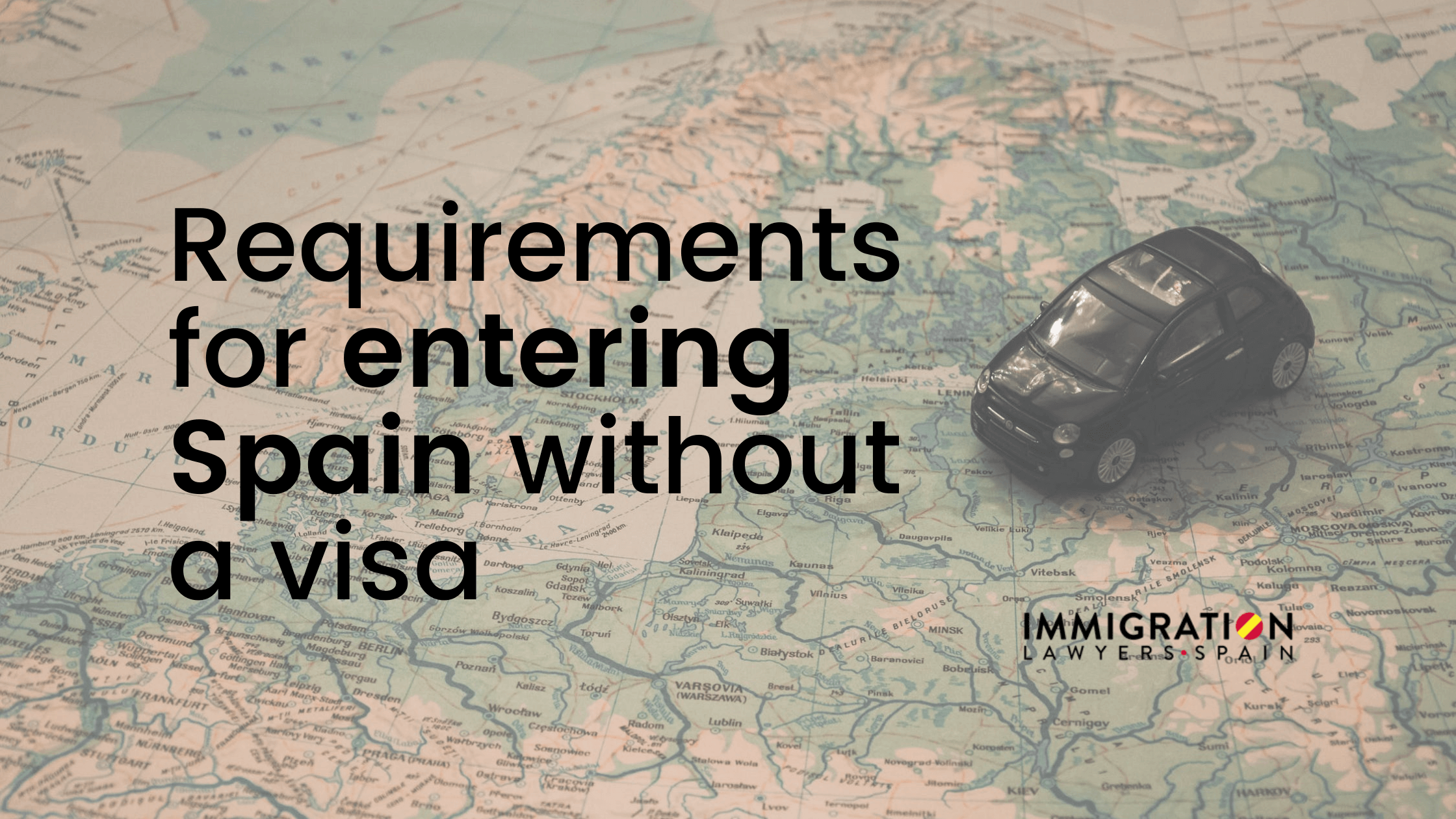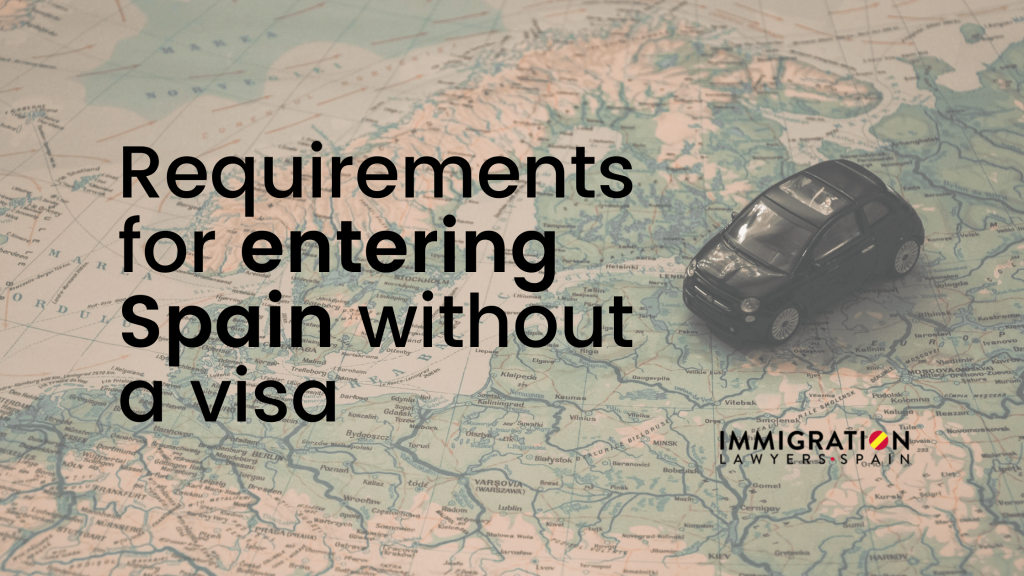
If you are planning to visit Spain for less than 3 months, keep on reading. Whether you are meeting a family member, coming for work purposes, or as a tourist; there are a number of considerations you should take into account. In this article we will show you all the requirements you will have to meet to enter Spain without a visa, including the latest news and changes in the area immigration law!
Content
ToggleDo I need a Visa to enter Spain?
Perhaps you need to travel to Spain for a short period of time. Short-stay trips are those that last less than 3 months, which means that you are allowed to stay in the country without the need to apply for a residence permit.
And even though you don’t need to get a residence permit, you must meet a series of requirements.
Depending on your nationality or country of origin, you must apply for a visa to enter the Schengen Area. This space is different from the territory covered by the European Union, but in both cases Spain is included.
Therefore, depending on where you come from, you will have to apply for a tourist visa or carry out procedures at the Spanish consulate before entering the country.
But, on the other hand, there are other countries that do NOT require a short term Schengen visa. These are the cases we will focus on throughout this article.
These countries that do NOT require a visa, are:
- Albania
- Andorra
- Antigua And Barbuda
- Argentina
- A.R.Y.M.(Ant. Yugoslav Rep. Macedonia)
- Australia
- Bahamas
- Barbados
- Bosnia and Herzegovina
- Brazil
- Brunei Darussalam
- Canada
- Chile
- Colombia
- South Korea
- Costa Rica
- Dominica
- El Salvador
- United Arab Emirates
- United Arab Emirates
- Georgia
- Grenada
- Guatemala
- Honduras
- Israel
- Japan
- Kiribati
- Malaysia
- Marshall Islands
- Mauritius
- Mexico
- Micronesia
- Moldova
- Monaco
- Montenegro
- Nauru
- Nicaragua
- New Zealand
- Palau
- Panama
- Paraguay
- Peru
- Solomon Islands
- Samoa
- Saint Kitts And Nevis
- San Marino
- S. Saint Vincent And The Grenadines
- Saint Vincent And The Grenadines
- Saint Vincent And The Grenadines
- Serbia
- Seychelles
- Singapore
- Timor Leste
- Tonga
- Trinidad And Tobago
- Tuvalu
- Uruguay
- Vanuatu
- Venezuela
However, even if your country does not require a visa, there are still a number of requirements that must be met to enter Spain.
We are talking about a series of requirements regulated by the EU regulation 2016/339 that will be checked by the national police at the border once you arrive in Spain, or directly by the airline before boarding the plane.
Do you have any doubts? Get in touch with our immigration lawyers and receive personalized legal advice and all your doubts solved:
Which are the requirements to enter Spain if I don't need a visa?
We will now cover the main requirements for entering Spain and not being returned to your home country at the border if you enter without a visa. They are practically the same as those we saw in our article regarding the different causes that could deny you entry to Spanish territory, with some differences.
Presenting your biometric passport
The first requirement you must meet is to present your biometric or magnetic reading passport.
This passport is your identification document and must accompany you at all times.
Obviously, it must be valid and up to date.
In other words, it is important that the expiration date of your passport is at least three months greater than the end of your planned stay in Spain.
Having confirmed accommodation and prove of it
The next requirement is that you have confirmed accommodation for the days you will be within the Schengen area.
And that is something you will have to show when you enter.
You can do this in two different ways:
- Firstly, by showing a reservation for a hotel/apartment/Airbnb or a rental contract, as long as it is already paid for and reserved by you as the owner.
- On the other hand, an invitation letter if your accommodation during your stay will be at someone’s (friend’s or relative’s) home. This letter of invitation will have to be processed and sent to you by the person you will be staying with before you travel to Spanish territory.
Travel health insurance
The next procedure that you will have to carry out before traveling to the country is to get travel health insurance.
This insurance must cover any unexpected situation that may happen to you in Spain and guarantee your hospitalization or medical care.
Round trip flight tickets
This is one of the most important requirements. When you enter Spain you must have both the plane ticket to Spain and the return one to your country of origin.
And the return flight must be within the 90 days allowed for your short-term stay, in no case outside that period.
This is because the Spanish authorities must make sure that you do not stay in the country any longer than the time allowed or become illegal.
Furthermore, it is very important that you have bought this ticket yourself as the holder to avoid generating doubts.
Bringing with you the required economic means
In addition, you must have the financial means to support yourself during the time you will be in Spain.
How much are we talking about? 95 € per day and per person. And a minimum of 950 euros (regardless of how long you stay) if the addition does not reach that amount.
As you can see, this requirement is closely related to the previous one. The economic means you will have to prove are calculated by multiplying 95 by the number of days between your outbound and return flight (and if it were less than 950, this would be the amount).
How to prove you have the money with you? You can do it either with cash or with debit/credit cards.
Passing a (possible) interrogation
It is possible that once you land and enter the airport, the national police will ask you several questions to understand the reasons why you are traveling to Spain.
If there is a risk that you will enter and then stay in the country illegally or that you intend to return after the allowed deadline, your entry will be denied; even if you meet all the requirements above.
In other words, if the border authorities do not understand what you will be doing in the country and how everything will happen, you may be forced to return.
Thus, here you can find a double recommendation.
First, don’t get nervous during the interrogation. These are simple questions where you have to demonstrate consistency. Explain the reasons why you have traveled to the country, how you have organized the trip, where will you stay, and you won’t face any problem.
Be clear about the reasons (whether it is for business, tourism or to visit a family member) and explain them calmly.
On the other hand, we recommend that you provide any evidence that confirms these reasons. For example, if you are coming to attend a business fare, show the ticket to the event. If you come for tourism, show a ticket to a museum or show.
Any confirmation document will be more than beneficial here.
ETIAS application
Finally, one of the latest immigration changes.
From 2022 onwards you will have to fill in and submit an extra form before traveling to Spain: the ETIAS form.
Even though you do not need a visa to enter Spain, you must fill out this document. And even if you fill it out, you will still have to comply with all the requirements seen up in this post.
The ETIAS form can be easily filled in completely online, by entering your passport and a functional email address.
You will have to provide a series of personal details as well as communicate the reasons for your entry into the country.
This is an effort made by all the countries of the Schengen Area to strengthen their internal borders.
Health requirements
Since the outbreak of the pandemic, the legal and immigration requirements are not the only ones to take into account.
Health requirements are another fundamental factor, and failure to comply with them directly invalidates your possibility of entering the country.
Needing or not a PCR negative test, complete vaccination, or filling in the entry form are some of the options that could be in force and that you should verify before buying your plane tickets.
Will I always be asked these documents when entering without a visa?
The answer is no (but be careful and keep on reading). You may know of cases where a foreigner has entered Spain and has not been asked for any of the above requirements.
She landed in Spain, left the airport and nobody asked her about the economic amount needed or to show her return flight ticket.
This is something that can happen.
And that is because the authorities do not always control ALL passengers on a flight. Perhaps on some occasions they only stop 5, others 10, and other times the whole plane.
So there is the possibility that you enter Spain and they will not ask you for anything we have seen in this article.
However, that is a risk you should not take: you would be going against the law.
Besides, even if sometimes they don’t stop everyone, they usually do stop you and check all the documentation. And if you can’t prove the requirements, you’ll have to go back to your home country immediately.
How to ensure a successful entry
And up till here the main requirements to enter the country without a visa. As you have seen, the fact that you are not required to have a visa according to your country of origin does not mean that you can enter freely.
You must comply with each and every one of the points seen in this article.
If you would like to stay after your entry in Spain and obtain a residence (and/or) work permit, we are here to help.
Get in touch with us detailing your situation and our team will assess your case and help you understand which are your options:
Get in touch with our lawyers and let us guide you step by step:





